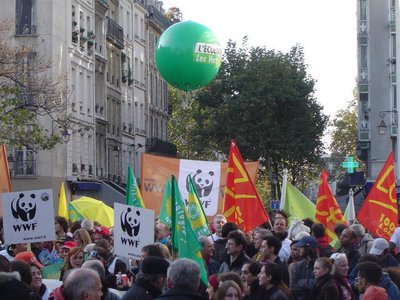November 4th Day of Climate Action: A Huge Success
---------------
This letter from Phil to everyone who contributed.
---------------
Campaign against Climate Change Thanks ! To everyone who helped make the November 4th National Climate March - and International Day of Climate Protest - a huge success.

Estimated numbers are 20,000 on the march, with another 10,000 in Trafalgar square. This is a fantastic leap forward from our previous Climate March, last December which was itself a huge breakthrough in climate/environmental campaigning.
It was challenging for us in many ways coordinating with new partners in "Stop Climate Chaos" but I think, in the event, our magnificent contribution to the Day spoke for itself, and our grass-rootsy campaigning mention all the hard work that so many of you put in to build this brilliant day !
Meanwhile the global campaign took a huge stride forward with events happening in 40+ countries around the world, around twice the number last time. Reports are still coming in so we've still not got a full picture of everything that happened but in Australia it was absolutely massive with>40,000 in Sydney, 30,000 in Melbourne and maybe 90,000 or so in more than>20 localities all around the country.
Check out http://www.globalclimatecampaign.org
and see pics from around the world http://gallery.globalclimatecampaign.org/n4global
Istanbul represents strongly for the second year despite heavy rain. Well done guys (actually it's a there is a gal at the helm, keep it up Gokesn!)

Paris gets in on the action for the first time:

Students get active in Taiwan:

Save This Page as a del.icio.us favourite
Labels: climate movement

Home









1 Comments:
"The British Prime Minister Tony Blair declared recently that there was no bigger long-term question facing the global community than the threat of a climate change due to man-made greenhouse gases. Unfortunately, the focus is misplaced. It is not the atmosphere which determines the fate of the climate. It is the ocean which does it.
Naval warfare during the two World Wars determined two major climate changes: a sustained warming which started at the end of World War I and lasted 20 years, and the next climatic shift which started during the winter 1939/40 and caused a four-decades global cooling. The extensive fighting at sea was a real threat for the normal course of the climate.
How could the course of international conflicts have been managed if the world's leading statesmen of the 20th century had been concerned with the climatic changes due to the impact that a war at sea could have had on the ocean and on the climate? Would Adolf Hitler have reconsidered his war aims in the summer of 1939 if the United States had warned him of their immediate implication in the looming war in case his decision would bring 1000 naval ships out on sea, thus generating a substantial climatic shift? The naval war thesis is an intriguing contribution to the 'global warming issue' and has the potential of revolutionising the current climate change debate. I have recently read a thesis about the impact of naval war on the climate change, and am interested in debating the idea. The thesis is written by Arnd Bernaerts and I have found it on www.1ocean-1climate.com.
"
Post a Comment
<< Home